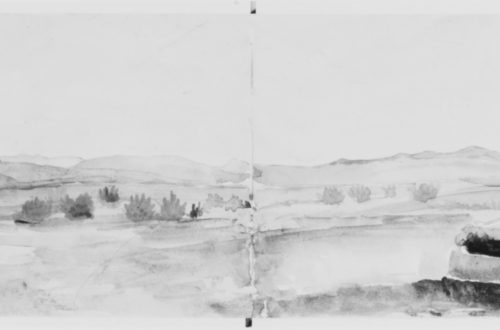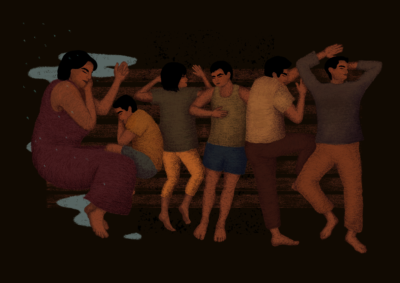“Perfectionist” by Diane Gurman
I began writing suicide notes decades ago in my twenties because I’m not the type of person who likes waiting until the last minute. At the time, I was alternating between sadness, depression, and suicidal ideation, still not committed to ending it all, but wanting to be prepared when that inevitable moment arrived. The thought of a positive turnaround never crossed my mind. I certainly couldn’t imagine bubbling over with happiness or lust for life. That was not my style. Nor did it occur to me to follow in the footsteps of that selfish or illiterate cadre of losers who depart without explanation. As a well-educated and considerate woman, I could, to the contrary, foresee not only a first draft off-the-top-of-my-head “Goodbye, cruel world!” but multiple iterations in a dogged attempt to get it right. If I was going to die by my own hand, I wanted my farewell epistle to be an awe-inspiring masterpiece.
My earliest efforts, though earnest, were embarrassing and highly personal tales of woe, what you’d expect from someone barely past adolescence—clichéd, maudlin, and sophomoric. Each recounted episode of rejection and criticism brought on self-pitying tears as I typed, and the only reason I didn’t melodramatically off myself on the spot was that I hadn’t the means or know-how. On one occasion I swallowed half a bottle of diet pills I happened to have in my medicine chest, and promptly threw it back up. Fast and effective weight loss, indeed. Just as well, though. The initial batch of suicide notes were without heft, utterly dismissible, and only made me look stupid.
Next, I traversed the other extreme—objective, well-researched, and copiously footnoted papers arguing that the world was not worth living in due to political and economic forces beyond the control of all but the very wealthiest and most powerful. I commented on issues ranging from climate change to religion-based oppression to cruelty to animals, modern day slave trading, elder abuse, the demise of the middle class, modern warfare and collateral damage, hunger, poverty, homelessness, and unethical medical studies conducted in third world countries. I even had one brief passage wherein I raged against the absurdly high price of women’s underwear. Those essays were fine and would probably dissuade future readers from seeing me as nothing more than a narcissistic whiner, but eventually I came to realize that no single missive, no matter how erudite or moving, could properly capture the mélange of emotions, thoughts, and considerations that go into the decision to die. A person might wake up in the morning (or middle of the night, more likely), announcing aloud, “I’ve got a brilliant idea—suicide! Eureka.” But where did the idea come from? Rationales could change on a daily basis, or even disappear altogether—temporarily. Moods altered, lessons were learned, new information accumulated. Triggering events did not stand in isolation. I realized, therefore, that the solution was to record a succession of suicide notes. For suicide is not a destination, but a journey.
The first step was to pick an appropriate medium. I’d already gone the traditional route of pen on paper and didn’t want to repeat myself. Computers, phones, and watches became obsolete too quickly, and the funds needed for upgrades and migrating across platforms weren’t readily available. Writing on the body had a certain allure, although my fondness for bathing could prove troublesome. Ultimately, I opted for the unadorned walls of my home, a small one bedroom, rent-controlled apartment. Then I selected a variety of pens, pencils, crayons, brushes, and paints in as many colors as the local big box office supply store had to offer. My goal was to cover every inch of space with text, illustrations, and found objects—garments, unused postage stamps, my college-era shot glass collection—that represented my miserable existence. For rewrites and deletions, I affixed blank pages to the wall with superglue or duct tape, or whitewashed the offending lines—lightly in case I needed to revert to the original draft in the future, or, with an admitted dose of malice, wanted to puzzle or strain the eyes of friends and acquaintances. They would doubtless be curious.
Second, I endeavored to express myself as creatively as possible. To this end, I incorporated clever one-liners, every form of poetry known to humankind (plus one I made up myself, using as inspiration those damnably frustrating poker games with their ridiculous rules), satire, essays of the narrative, descriptive, expository, and persuasive style, enigmatic ramblings dappled with ellipses, favorite jokes (even if I was the only one who got them), conspiracy theories, musical compositions, collage, drawings, and paintings (though my level of talent in the fine arts was open to debate), a darkly humorous one-act play, mushy love letters (nod to the past), apologies, elegies, diatribes blaming friends, relatives, exes, colleagues, supervisors, apartment managers, religious figures, the government, and most importantly myself.
A portion of wall space was dedicated to educating others, because life is short and I wanted to leave the world a better place. Advice from Miss Manners overlapped essays by Bertrand Russell and pages excerpted from the Illustrated Encyclopedia of Women Scientists. I also posted lists of regrets, slights both received and subtly conveyed, illegible scribblings, sarcasm, and solitary words that resonated with me (avoiding the obvious “despair,” “loneliness,” and “futility,” but including “murky,” “doughnuts,” and “spectacular”). To alleviate intermittent and annoying feelings of guilt, I offered compliments and sincere thanks to friends and relatives for their seemingly heartfelt but sadly fruitless efforts to save me from myself.
There were also blank spaces representing the nothingness of life.
I considered recording an audiovisual version of my progress toward death, but since I wasn’t 100 percent sure that I wouldn’t come off looking foolish and pathetic, I passed. Better to leave some mystery.
None of my entries were dated or affixed to the wall in sequence. I didn’t want to be tied down to a particular chronological order or have my readers attempting to interpret my adieu in ways I didn’t intend, much less make it about themselves. Why permit anyone to wonder, “What was happening on that day? Did I talk to her? Fail to return a call? Did she gain access to my supposedly confidential letter of recommendation which, at best, stinted on praise, as though given through gritted teeth?”
I also omitted personal details wherever possible. I knew that my reasoning must be irrefutable, and people were less likely to come up with rebuttals if I kept everything a bit vague. For example, if instead of comparing a romantic relationship to an unpaid part-time job with irregular hours, I wrote “Robert didn’t love me,” at least one viewer undoubtedly would respond by thinking, If only she had told me that the break-up was making her suicidal! I would have convinced her that she deserved someone better! (Never mind that my friends gave up on match-making long ago when they grasped that my faults and idiosyncrasies were such that they didn’t want anyone they knew to even meet me much less become my significant other.) There was also the chance that I might get facts wrong, exasperating those with better memories, since once I was dead they couldn’t correct me.
Near the door, I made available a guest book so that visitors could memorialize me (and themselves) with yearbook-type inscriptions, such as “2 good 2 B 4 gotten.”
Several years into the project, I ran alarmingly short of cash. My meager earnings as a part-time adjunct no longer covered my ever-increasing expenditures for the high-quality pens I felt compelled to use (the empty carcasses of which were super-glued to the wall upon expiration). I was also working less often because fewer institutions seemed inclined to hire me. Luckily, I had another brilliant idea: I would sell suicide form letters. Gauging by statistics showing a rise in the number of suicides across the demographic spectrum, I was certain there’d be a substantial market. Surely there were many who weren’t concerned with length or literary merit, but simply wanted to get it over with and follow the proper etiquette: note, death, end of story. So I drafted a few easily customizable forms, and encouraged prospective buyers to add, modify, or run wild with it if the spirit moved them. Also appended was a stern warning: You may not kill yourself if you have a spouse, pet, or child. Not allowed! The following were my wares. Cash or money order preferred.
Sample #1
To Whom It May Concern:
I have decided to kill myself. Please do not suspect foul play, coercion, or accidental death, although if it makes you feel better and you’re comfortable lying, you may inform others that I died peacefully in my sleep.
My reasons for committing suicide are as follows:
__________________________________________________________________________________________________
__________________________________________________________________________________________________
__________________________________________________________________________________________________
__________________________________________________________________________________________________
If the above lines are blank it’s because I don’t feel like talking right now, and you wouldn’t understand anyway.
Please dispose of my remains as follows:
_____ Cremation
_____ Burial
_____ Let the coyotes eat me
_____ Just leave me alone
If you find me and I’m not dead yet,
_____ Please do not resuscitate
_____ Don’t just stand there—call 911!
Thank you for respecting my wishes.
BY: ______________________________________ Date: ____________________
Signature of Person Committing Suicide
Print Name: ______________________________________
Sample #2
Dear World,
I don’t want to grow older. I’m not sick, just sick of life. I’m not completely senile though appear to be on my way. Do not feel smug. Cognitive decline begins at 30, so you too are either on your way or soon will be, regardless of the copious snake oil supplements you take.
I hate the obsession people have with making the best of things, living life to its fullest, looking on the bright side, being thankful for what you’ve got, fighting the good fight. I am an iconoclast.
My life has been neither wonderful nor horrible. I’ve never been beautiful or ugly. I’m not brilliant or stupid.
I am haunted by my mistakes, misdeeds, weaknesses, everything I’ve done wrong that I can recall. I don’t want to live with those memories anymore.
I am not like one of those elderly people portrayed on television or in movies who finds a new purpose late in life—love, work, family, friendship, or all of the above. I am a normal person, the kind who is never featured in any medium.
There are too many people in the world. I might be missed for a while, but that’s not enough of a reason to stay. I am thin-skinned, unprotected, and unhappy. I really do want to die.
______________________________________ _________________________
Signature Date
Sample #3
Dearest _______________,
I cannot live without you. I mean it.
(insert link to pop song that says exactly what you mean but cannot say or sing as well, much less better, yourself)
I’m sorry you don’t love me as much as I love you. Or at all.
(Maybe add that you always meant to learn how to play a guitar and you’ve been writing song lyrics already but they’re private. Unless the love of your life really wants to see them and then he or she should look under the mattress.)
I hope that someday you’ll know how I feel.
xxxxxxxxxxxxxxxxxxxxxxxxxxxxxxxxxxxxxxxxxxxxxxxxxxxxxxxxxxxxx
ooooooooooooooooooooooooooooooooooooooooooooooooooooooooooooo,
(Either text message or copy this over in your own handwriting, then sign and pin to your shirt. Or your chest. Whichever seems more effective.)
Sample #4
Dear ___________________,
I am very ill. You may think that I don’t know it, but I do. I am well aware that I can’t get out of bed, walk down the hall to the kitchen, and help myself to a piece of cake. To start with, I can’t get out of bed without assistance. Nor can I walk without some badly-designed piece of hardware called a “walker.” I have a colostomy bag. A stroke has robbed me of the ability to speak intelligibly. My vision is nearly gone. Finally, I have no say at all about what I’m allowed to eat.
You’re not helping matters by fussing over me, never letting me have a moment’s privacy, and telling others how awful I look when you think I’m asleep and can’t hear. Neither of us gets a thrill out of bathing me or emptying my bag, so let’s cut our losses, shall we?
I may or may not be in my right mind, but let’s pretend that I am.
I hereby give you permission to administer an overdose of morphine, as much as it takes. Afterward, hide the bottle. Pretend you’re in a TV crime show—drive far away and dispose of it in someone else’s trash can. Wear rubber gloves and dark clothing. Go at night. No one will know. Especially if you use your head and destroy this suicide note.
Please donate my body to science so that one of those arrogant, apathetic, middle-of-their-medical-school-class physicians might get it right next time. Or next century.
Sincerely,
_________________________________________
Sample #5
Enough.
I had had enough. For years I’d continued to work on my hoped-for masterpiece, confident that the money I earned would pay not only for the tools of my trade, but also for cremation and a catered memorial service where guests could gather and celebrities would take turns reading from my soon-to-be award-winning, suicide “note.” However, having reached the point of exhaustion concerning the world and my place in it, I came to apprehend that there was a catch: although all my walls were completely covered (except for the spaces left blank on purpose to show the nothingness, as previously stated, the utter futility of life, words, action, etc.), I was surprised and disturbed to find that I wasn’t yet ready to swallow the pills, slit the wrists, or pull the trigger. My hesitation wasn’t due to an epiphany about loving life after all, a burst of faith or religious fervor, or the discovery of a newfound purpose in living. I still believed that one shouldn’t view life as an endurance contest. The person who lives the longest doesn’t necessarily win.
The reason was, and continues to be that, despite my best efforts, I fear that something has been left unsaid or not stated in the best, most articulate way. I cannot stop criticizing myself. How could I have thought that my assemblage was a tour de force? I was wrong. I’m not smart or talented enough. I’m no damn good, even though I try so hard. That’s why I have to kill myself. But I can’t! Because the letter isn’t right and never will be! I’ve trapped myself in precisely the kind of set-up for failure that habitually plagues high-intelligence neurotics such as myself. It’s maddening. Perfection, you are killing me! And so, for now, life goes on.*
______________________________________________________________________________________________________________________________________________________
* Instructions to future publisher: if I die of old age, please make sure the author of the catalog that will accompany the museum installation that my apartment becomes emphasizes the unfinished nature of the work. It might be helpful to note that I died slumped in the doorway between living room and kitchen, gourmet scented felt-tip marker in hand, as, regardless of the eventual truth of the matter, this is how I would like my death recorded. Feel free to move the body and take photos.
© LIT Magazine Issue #33, 2019




